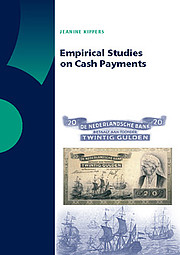Empirical Studies on Cash Payments Defended on Thursday, 9 September 2004
Cash is still the most common means of daily payments. The large number of cash payments is supported by a costly distribution system in which retailers, banks and central banks participate. Currency is issued in a range of bank note and coin denominations to facilitate efficiency in cash payments. The purpose of this thesis is to study the performance of a currency range in practice. It presents a number of empirical studies on cash payments at the individual payment level, whereby cash payments are viewed as the outcome of a choice process. This type of analysis calls for labor-intensive data collection methods and the development of a sophisticated econometric model. This thesis introduces such a model for cash payments, and it reviews its application to three unique data sets of cash payments. The data concern payments in the Netherlands before and after the transition from the guilder to the euro in 2002, and payments in an experimental setting. The estimation results allow for an assessment of the use of different bank note and coin denominations in cash payments, and of possible preferences for one of more denominations. Currency research generally approaches currency use from a macroeconomic point of view. The novelty of this thesis is that it contributes to currency research by focusing on individual cash payments.
Keywords
Cash payments, Euro, Behavioral aspects, Denominations, Currency use, Guilder, Experimental data, Payment algorithms, Emperical study, Performance







